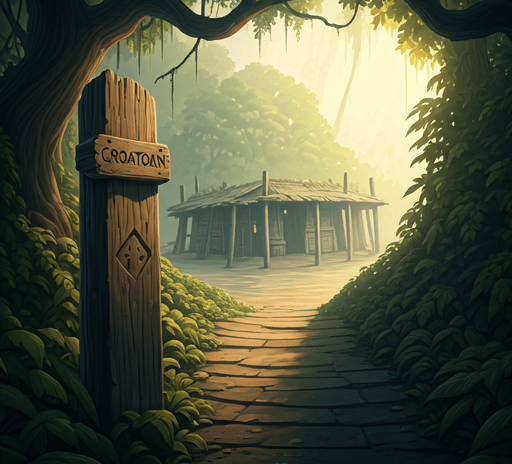The Lost Colony of Roanoke: A Historical Puzzle That Remains Unsolved
The Lost Colony of Roanoke remains one of America's greatest historical mysteries. Founded in 1587 under John White's leadership, the settlement vanished without a trace by 1590, leaving only the cryptic word "CROATOAN" carved into a post. Theories about the colonists' fate range from assimilation with Native tribes to relocation or conflict. Despite modern archaeological efforts, the true story of Roanoke continues to intrigue and elude historians, symbolizing the resilience and challenges of early exploration.
DipVai
1/29/20252 min read


In the annals of American history, few stories captivate the imagination quite like that of the Lost Colony of Roanoke. Established in 1587 by English settlers under the leadership of John White, this settlement on Roanoke Island, part of present-day North Carolina, was intended to be England’s first permanent colony in the New World. However, its mysterious disappearance remains one of the greatest unsolved puzzles in American history.
The Founding of the Colony
The Roanoke expedition was sponsored by Sir Walter Raleigh, a prominent figure in Queen Elizabeth I’s court. John White, an artist and cartographer, was appointed governor and tasked with leading the settlers, who included men, women, and children. Among the settlers was White’s own daughter, Eleanor Dare, who gave birth to Virginia Dare, the first English child born in America.
Upon arrival, the colonists faced immediate challenges. They struggled to find food, establish relations with Native American tribes, and protect themselves from potential threats. Despite these difficulties, they were determined to build a new life in the New World.
John White’s Return to England
In late 1587, White made the difficult decision to return to England to secure additional supplies and reinforcements for the struggling colony. Unfortunately, his return was delayed by the outbreak of war between England and Spain. The Spanish Armada’s attack in 1588 forced all available ships, including those meant for resupplying Roanoke, to be diverted for national defense.
It wasn’t until 1590 that White was able to return to Roanoke. When he arrived, he was met with an eerie silence. The settlement was completely abandoned, and the colonists were nowhere to be found. The only clue left behind was the word “CROATOAN” carved into a wooden post and the letters “CRO” etched into a nearby tree.
Theories and Speculation
Over the centuries, historians and archaeologists have proposed numerous theories about the fate of the Roanoke colonists:
Assimilation with Native Tribes: One of the most widely accepted theories is that the colonists sought refuge with the Croatan tribe, who lived on Hatteras Island. This theory is supported by reports of Native Americans with European features and knowledge of English customs.
Relocation and Dispersal: Some believe the settlers may have tried to move inland or further along the coast in search of more hospitable land but succumbed to starvation, disease, or conflict.
Spanish Attack: Another possibility is that Spanish forces, who were hostile to English colonization efforts, discovered and destroyed the colony.
Environmental Factors: Harsh weather conditions, such as drought, may have contributed to the colony’s downfall.
Modern Investigations
In recent years, archaeological excavations have uncovered tantalizing evidence that supports some of these theories. Artifacts such as pottery fragments and tools found on Hatteras Island suggest a possible connection between the Roanoke settlers and the Croatan people. Additionally, DNA studies are being explored to trace potential descendants of the lost colonists.
Despite these efforts, definitive proof of what happened to the Roanoke colony remains elusive. The mystery continues to intrigue historians, archaeologists, and amateur sleuths alike.
A Legacy of Endurance
The story of the Lost Colony of Roanoke is more than just a historical enigma—it’s a testament to the enduring human spirit and the challenges faced by early settlers in the New World. While the fate of the colonists may never be fully known, their legacy lives on as a symbol of exploration, resilience, and the enduring quest for answers.
As historians and researchers continue to uncover new evidence, the story of Roanoke remains a vivid reminder of America’s complex and fascinating past.
Get in touch
itsusdipvai@gmail.com
